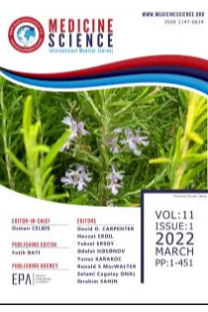Assessment of physicians' knowledge in transfusion medicine in eastern part of Turkey
___
1. Szczepiorkowski ZM, Dunbar NM. Transfusion guidlines: when to transfuse. Hematology Am Soc Hematol Educ Program. 2013;2013:638-44.2. Kaur P, Kaur G, Kaur R, Sood T. Assessment of Impact of Training in Improving Knowledge of Blood Transfusion among Clinicians. Transfus Med Hemother. 2014;41(3):222-6.
3. Gharehbaghian A, Shahshahani HJ, Attar M, Bonab MR, Mehran M, Namini MT. Assessment of physicians knowledge in transfusion medicine, Iran, 2007. Transfus Med. 2009;19(3):132-8.
4. Rothschild JM, McGurk S, Honour M, Lu L, McClendon AA, Srivastava P, Churchill WH, Kaufman RM, Avorn J, Cook EF, Bates DW. Assessment of education and computerized decision support interventions for improving transfusion practice. Transfusion. 2007;47:228-39.
5. Tinmouth A. Reducing the amount of blood transfused by changing clinicians' transfusion practices. Transfusion. 2007;47(2):132S-136S.
6. Rock G, Berger R, Pinkerton P and Fernandes B. A pilot study to assess physician knowledge in transfusion medicine. Transfus Med. 2002;12(2):125-8.
7. Saillour-Glénisson F, Tricaud S, Mathoulin-Pélissier S, Bouchon B, Galpérine I, Fialon P, Salmi LR. Factors associated with nurses' poor knowledge and practice of transfusion safety procedures in Aquitaine, France. Int J Qual Health Care. 2002;14(1):25-32.
8. Reza PA, Aziz SV, Ali MA, Marjan MH, Reza TM. Evaluation of knowledge of healthcare workers in hospitals of Zabol city on proper methods of blood and components transfusion. Asian J Transfus Sci. 2009;3(29:78-81.
9. Hijji B, Parahoo K, Hussein MM, Barr O. Knowledge of blood transfusion among nurses. J Clin Nurs. 2013;22(17-18):2536-50.
10. Arinsburg SA, Skerrett DL, Friedman MT, Cushing MM. A survey to assess transfusion medicine education needs for clinicians. Transfus Med. 2012;22(1):44-9.
11. National Blood and Blood Products Guide, The Ministery of Health of Turkey, 2009.
12. Cauffman JG, Forsyth RA, Clark VA, Foster JP, Martin KJ, Lapsys FX, Davis DA. Randomized controlled trials of continuing medical education: what makes them most effective? J Contin Educ Health Prof. 2002;22(4):214-21.
13. Kasraian L, Tavassoli A. A survey of resident physicians' knowledge concerning transfusion medicine in Shiraz, Iran. Asian J Transfus Sci. 2014;8(2):118-20.
14. Salem-Schatz SR, Avorn J, Soumerai SB. Influence of knowledge and attitudes on the quality of physicians' transfusion practice. Med Care. 1993;31(10):868-78.
15. O'Brien KL, Champeaux AL, Sundell ZE, Short MW, Roth BJ. Transfusion medicine knowledge in Postgraduate Year 1 residents. Transfusion. 2010;50(8):1649-53.
16. Mitchell SA, Strauss RG, Albanese MA, Case DE. A survey to identify deficiencies in transfusion medicine education. Acad Med. 1989;64(4):217-9.
17. Toy P. Guiding the decision to transfuse. Arch Pathol Lab Med. 1999;123(7):592-4.
18. Cook CB, Wilson RD, Hovan MJ, Hull BP, Gray RJ, Apsey HA. Development of computer-based training to enhance resident physician management of inpatient diabetes. J Diabetes Sci Technol. 2009;3(6):1377-87
- ISSN: 2147-0634
- Yayın Aralığı: 4
- Başlangıç: 2012
- Yayıncı: Effect Publishing Agency ( EPA )
Burak METE, Erkay NACAR, Çiğdem TEKİN, Ertan UNVER, GÜLSEN GÜNEŞ
Mehmet DEMİR, Ümit YILMAZ, Cemil ÇOLAK, Yılmaz ÇİĞREMİŞ, Fatma ÖZYALIN, İbrahim TEKEDERELİ, Ayten KILINÇLI, Süleyman SANDAL
Assessment of physicians' knowledge in transfusion medicine in eastern part of Turkey
Soner Sertan KARA, Duygu KARA, Ali FETTAH, Gokce Pinar REİS, Alev Cansu CERTEL
Oğuzhan YILDIRIM, Yüksel SEÇKİN, Yılmaz BİLGİÇ, Melih KARINCAOĞLU, Murat ALADAĞ
Levels of toxic metals and trace elements in autopsy liver tissue samples
Servet Birgin IRİTAS, Ahmet Hakan DİNÇ, Aybike DİP, Bahri Melih ÜNAL, Mevlüt ERTAN, Tülin SÖYLEMEZOĞLU
Our clinical experiences in ultra-sound guided peripheral nerve blocks: a retrospective evaluation
Ülkü ÖZGÜL, MEHMET ALİ ERDOĞAN, Muharrem UÇAR, NURÇİN GÜLHAŞ, MAHMUT DURMUŞ
Factors influencing the water consumption behaviors of the medical students at Inonu University
Burak METE, ERKAN PEHLİVAN, Ayşe BARAN, Duygu ÇELİK, Erkay NACAR, Esin CAKMAK
ÇİĞDEM YÜCEL, Turan TURHAN, Esin ÇALCI
BEGÜMHAN TURHAN, Dilek YAMAK, Murat Ali CİNAR, Alper HAZNEDAR, Sedat YİĞİT, Birol YAMAK
Seroprevalence of Hepatitis A Virus in Inonu University Medical Faculty Hospital, 2015
YÜCEL DUMAN, MEHMET SAİT TEKEREKOĞLU, SELMA AY, Ayfer SERİNDAĞ
